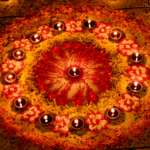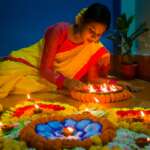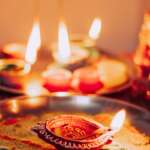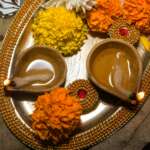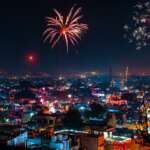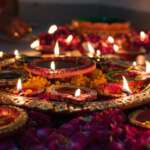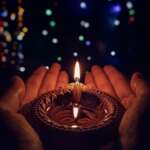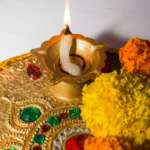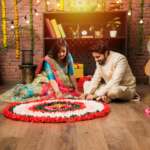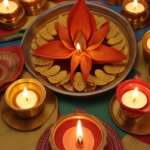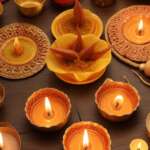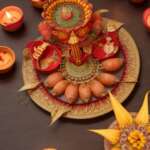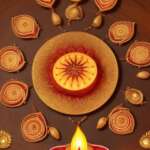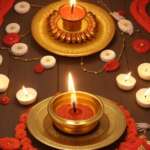When did the Diwali (Dīvali in Dīpāwali in or Deepavali) start?
About Diwali (Dīvali in Dīpāwali in or Deepavali) Festival
Diwali, also called Dīvali, Dīpāwali, or Deepavali, is an ancient Hindu festival of lights celebrated every autumn in the northern hemisphere. It is one of the most popular festivals of Hinduism and is celebrated in India, Sri Lanka, Nepal, Singapore, Malaysia, and more recently, in countries around the world with significant Indian diaspora communities. Diwali typically falls on the new moon day between mid-October and mid-November, and is celebrated for five continuous days. The festival is characterized by diyas (oil lamps or candles) lit inside and outside homes, fireworks,worship, puja (offering prayers to the gods and goddesses), and feasting. Traditionally, the new moon night is dedicated to the goddess Lakshmi – the goddess of wealth and prosperity. People also pray for well-being, peace, and happiness. The second day is dedicated to the ‘Return of Rama’ from his fourteen-year long exile and victory over Ravana. The third day marks the worship of the goddess Saraswati – the patron of knowledge, wisdom, and music. The fourth day celebrates the divine union of Lord Vishnu and Goddess Lakshmi. And, the fifth day is typically celebrated as the ‘Yama Dvitiya’ or Bhai Duj, with sisters and brothers expressing love and affection for one another.
Introduction
Diwali, also known as Dīvali, Dīpāwali, or Deepavali, is a vibrant and widely celebrated holiday in India and other parts of the world. It is a festival of lights, symbolizing the triumph of good over evil, and is deeply rooted in Hindu mythology. However, it is not just limited to Hinduism, as it is also celebrated by people of other faiths such as Sikhism, Jainism, and Buddhism. This multi-day festival is full of joy, positivity, and cultural significance. Let’s take a closer look at the meaning, history, customs, and impact of Diwali.
Key Takeaways
– Diwali is a festival of lights that celebrates the victory of good over evil.
– It is a multi-day festival celebrated by people of different faiths in India and other parts of the world.
– The holiday holds great cultural and spiritual significance and is full of vibrant traditions and celebrations.
History and Origin
Diwali has its roots in ancient India, with various mythological tales associated with it. The most popular legend revolves around the return of Lord Rama, an incarnation of the Hindu deity Vishnu, to his kingdom of Ayodhya after 14 years of exile. People welcomed him by lighting diyas (clay lamps) and setting off fireworks to illuminate his path and celebrate his homecoming.
Another mythological tale linked with Diwali is the story of Lord Krishna defeating the demon king Narakasura, who had been terrorizing the people. The triumph of good over evil is a common theme in many Hindu festivals, and Diwali is no exception.
Historical Context
Over the centuries, Diwali has evolved and absorbed various cultural and historical influences. It was celebrated as a harvest festival in ancient times, with people lighting lamps to invite wealth, prosperity, and good health into their homes. During the Mughal period, Diwali took on a new meaning as a celebration of the victory of Emperor Jehangir over his rebellious son Khusrau. In some parts of India, Diwali is also celebrated to commemorate the marriage of the god Vishnu to the goddess Lakshmi.
In modern times, Diwali has become a global festival, with Hindus and non-Hindus alike joining in the festivities. It is a time for families to come together, exchange gifts, and indulge in delicious food and sweets.
Significance and Meaning
Diwali holds immense cultural and spiritual significance for those who celebrate it. It is a time for reflection, new beginnings, and hope for a brighter future. The lighting of diyas and other traditional practices during Diwali are believed to signify the victory of good over evil, light over darkness, and knowledge over ignorance.
Cultural Significance
The traditional elements of Diwali, such as lighting diyas, rangolis (decorative designs made with colored powder), and exchanging sweets and gifts, have deeper symbolic meanings. The lighting of diyas not only adds to the festive ambiance but also holds a spiritual significance as it represents the eradication of darkness from one’s life and the welcoming of positivity and prosperity. Rangolis are a way to decorate homes and invite good luck, while the exchange of gifts and sweets symbolizes the sharing of happiness and strengthening of relationships.
Symbols and Decorations
One of the most prominent symbols of Diwali is the diya. Lit diyas can be seen adorning homes, markets, and public spaces during the festival. Other common decorations include colorful rangolis, lanterns, and electric lights, adding to the vibrant atmosphere.
Traditions and Celebrations
Diwali is a five-day festival filled with traditions, customs, and celebrations. Each day has its significance and rituals, with the main day being celebrated on the third day.
On the first day, known as Dhanteras, people clean and decorate their homes, and purchase new utensils or gold/silver items as a symbol of prosperity. The second day, Naraka Chaturdashi, involves lighting lamps and offering prayers to seek blessings and protect against evil forces.
The third day, known as Diwali, is the main day of celebrations, with families coming together for a feast and exchanging gifts. People also visit temples and offer prayers to the goddess of wealth, Lakshmi. The fourth day, Govardhan Puja, is dedicated to Lord Krishna and is celebrated by making offerings of food and sweets. The fifth and final day, Bhai Dooj, is a day to celebrate the bond between brothers and sisters.
Food and Cuisine
Like any other festival, food plays an important role in Diwali celebrations. Unique and delicious dishes are prepared for the festive meals, with each region having its specialties. Some traditional Diwali dishes include samosas, gulab jamun, kaju katli, and barfi. Families also prepare snacks and sweets at home and offer them to guests and neighbors as a gesture of goodwill.
Attire and Costumes
During Diwali, people dress up in their finest traditional attire. Women wear elegant sarees or colorful lehengas, while men opt for kurta-pyjamas or dhotis. Children often dress in traditional outfits like ghagra-choli or dhoti-kurta for school events and family gatherings.
Music and Songs
Music and dance are integral parts of Diwali celebrations. Traditional songs and hymns, known as bhajans, are sung in praise of the gods and goddesses. People also play popular Diwali songs and Bollywood music to add to the festive spirit.
Geographical Spread
Diwali is a national holiday in India and is prominently celebrated across the country. However, it is most widely celebrated in the northern states of Uttar Pradesh and Punjab. In southern India, the festival of lights is celebrated as Deepavali, and its traditions and customs may vary slightly from the northern states.
Modern-Day Observations
In the modern age, Diwali has undergone some changes, especially in urban areas. Along with traditional rituals, people also incorporate modern elements such as lighting up their homes with electric lights and fireworks displays. However, there is also a growing awareness of the environmental impact of such practices and a movement towards celebrating a more eco-friendly Diwali.
Interesting Facts or Trivia
– Diwali is the largest and most significant holiday in India, with over 900 million people celebrating it.
– Diwali marks the beginning of the Hindu New Year.
– The name Diwali comes from the Sanskrit word ‘Deepavali,’ which means a row of lights.
– The golden temple in Amritsar, one of the most revered religious sites for Sikhs, is beautifully illuminated during Diwali celebrations.
Legends and Myths
There are many mythological tales associated with Diwali, as mentioned earlier. Another legend depicts Diwali as the celebration of the marriage of Lord Vishnu and Goddess Lakshmi. In some parts of India, Diwali is celebrated to honor the return of the Pandavas, the legendary Hindu heroes, from exile.
Social and Economic Impact
Diwali has a significant impact on Indian society and its economy. The holiday season sees a surge in consumer spending, with people buying new clothes, gifts, and decorations. It is also an opportunity for small businesses and artisans to sell their products and boost their sales.
Economic Impact
Diwali is a major source of revenue for businesses and the tourism industry. Many popular tourist destinations in India witness a surge in visitors during this time, generating income for the local economy. The festive season also leads to an increase in demand for goods and services, providing employment opportunities for many people.
Environmental Aspect
Due to the extensive use of fireworks and decoration materials made of plastic, Diwali has been criticized for its negative impact on the environment. However, there is a growing awareness among people to celebrate the festival in an eco-friendly manner by avoiding excessive use of plastic and opting for green decorations and sustainable practices.
Tourist Guide
Visa: Foreign tourists must obtain an e-visa or a traditional visa to enter India. It is recommended to apply for the visa well in advance of your planned travel dates.
Best Time to Visit: The dates of Diwali vary each year according to the Hindu calendar. However, it usually falls between mid-October to mid-November. The main celebrations take place on the third day.
Key Locations: Some of the best places to experience Diwali festivities in India include Delhi, Varanasi, Jaipur, and Mumbai.
Must-See Events: Some must-see Diwali events include lighting up the Golden Temple in Amritsar, the Diwali market in Delhi’s Chandni Chowk, and the Diwali celebrations at the Dashashwamedh Ghat in Varanasi.
Activities: Participate in lighting diyas, making rangolis, and joining local families for traditional feasts.
Dress Code: Wear traditional Indian attire such as kurtas, sarees, or lehengas. Avoid wearing revealing clothing or shorts.
Do’s and Don’ts: Do respect local customs and traditions. Avoid taking pictures of people without their permission, especially during prayers or religious ceremonies. Don’t litter or contribute to air pollution by using excessive fireworks.
Travel Tips: Plan your trip in advance and book accommodations, flights, and transportation well ahead of time. Be mindful of cultural sensitivities and respect the local customs.
Language Tips: The official language of India is Hindi, but English is widely spoken and understood. Learn a few basic phrases in Hindi to communicate with the locals.
Emergency Contacts: In case of an emergency, dial 100 for police assistance, 102 for medical emergencies, and 108 for ambulance services.
Local Perspective
“Diwali is my favorite time of the year. The atmosphere is full of excitement, warmth, and positivity. It is a time when people come together to celebrate, connect with their loved ones, and spread happiness. The lighting of diyas and the colorful decorations make the whole city come alive. It is a beautiful and unforgettable experience.” – Ayesha, a local from Delhi.
Global Relevance
The festival of Diwali is not just limited to India, as it is celebrated by people of Indian origin and other communities worldwide. It is a great opportunity to learn about Indian culture, traditions, and mythology. Diwali celebrations are also a major tourist attraction, drawing people from all over the world to experience the vibrant festivities and traditions.
Other Popular Holiday Info
In addition to Diwali, other holidays celebrated across India during this festive season include Dussehra, Navratri, and Bhai Dooj. Each of these holidays has its unique significance and customs.
Conclusion
Diwali is a festival that transcends religion and brings people together to celebrate the triumph of good over evil and light over darkness. It is a time for reflection, hope, and joy. Whether you are an Indian or a tourist, Diwali is an experience not to be missed. So, come and immerse yourself in the vibrant celebrations and create memories that will last a lifetime.
How to Say "Diwali (Dīvali in Dīpāwali in or Deepavali)" In Different Languages?
- Afrikaans
- Diwali (af-ZA)
- Austrian German
- Deepavali (de-AT)
- Bahasa Indonesia
- Dhīpaavali (id-ID)
- Bengali
- দীপাবলী (bn-BD)
- Cantonese
- 農曆新年 (yue-Hant-HK)
- English
- Diwali (en-GB)
- French
- Diwali (fr-FR)
- German
- Deepavali (de-DE)
- Hebrew
- פיסטה (he-IL)
- Hindi
- दीपावली (hi-IN)
- Japanese
- ディーワーリー (ja-JP)
- Malay
- Diwali (ms-MY)
- Nepali
- दीपावली (ne-NP)
- Portuguese
- Diwali (pt-PT)
- Romanian
- Diwali (ro-RO)
- Sinhalese
- දිවයින (si-LK)
- Spanish
- la Diwali (es-ES)
- Thai
- ทุกวันดิวัลลี (th-TH)
- Zulu
- i-Diwali (zu-ZA)
Diwali (Dīvali in Dīpāwali in or Deepavali) Also Called
The Festival of Lights, the Festival of Joy, the Festival of Wealth, and the Victory of Good Over Evil.Countries where "Diwali (Dīvali in Dīpāwali in or Deepavali)" is celebrated:
FUN FACT:
In year 4th century CE, Diwali (Dīvali in Dīpāwali in or Deepavali) is celebrated on November 4 for the first time.FESTIVAL CHECK: We strive for accuracy and fairness. But if you see something that doesn't look right, please click here to contact us!
Travel Recipes, Food and Cuisine
1. What is the Diwali (Dīvali holiday in Dīpāwali holiday in or Deepavali) and why is it celebrated? Diwali, also known as Dīvali or Deepavali, is a widely celebrated Hindu festival that marks the victory of good over evil, light over darkness, and knowledge over ignorance. It falls on the 15th day of the Hindu month of Kartik (October/November) and is considered one of the most significant festivals in India. 2. What is the significance of food in Diwali celebrations? Food plays a significant role in Diwali celebrations as it is believed to bring prosperity and abundance to the household. It is also a time for families to come together and share traditional meals, strengthening bonds and creating fond memories.Food and Cuisine - Diwali (Dīvali holiday in Dīpāwali holiday in or Deepavali)
Signature Dishes
Diwali is a time of indulgence and celebration, and no festival in India is complete without the mouth-watering cuisine that is synonymous with it. Here are some of the quintessential dishes that you can find on the Diwali dinner table.- Mithai: These traditional sweets are an essential part of Diwali celebrations, and each region in India has its variety. Some popular options include Gulab Jamun, Ras Malai, Kaju Katli, and Ladoo. These sweets are made from a combination of ingredients like sugar, dairy, nuts, and spices, making them irresistibly delicious.
- Savory Snacks: Along with sweets, savory snacks are also a crucial part of Diwali cuisine. Samosas, Kachoris, and Aloo Tikki are popular options that are enjoyed during this festival. These fried or baked snacks are typically made with a crispy outer layer and a flavorful filling.
- Biryani: This aromatic rice dish is a staple in most Indian households, and no Diwali celebration is complete without it. It is traditionally made with fragrant rice, spices, and meat, but there are also vegetarian options available. It is served with a side of raita, which is a cooling yogurt and vegetable condiment.
- Kheer: This creamy and delicious rice pudding is a must-have on the Diwali dinner menu. It is made with rice, milk, sugar, and fragrant ingredients like cardamom and saffron. Some variations also include the addition of nuts and dried fruits, making it a rich and indulgent dessert.
Regional Variations
India is a diverse country with various cultures, languages, and cuisines, and each region has its twist on the traditional Diwali dishes. For example, in the North, Diwali is celebrated with a feast of rich and heavy dishes like biryani and kheer. In the South, the focus is on light and healthy meals, and you can find dishes like Idli, Dosa, and Sambhar on the dinner table. In the West, the cuisine is heavily influenced by Gujarati and Rajasthani flavors, while the East is known for its spicy and flavorful dishes like Chingri Malai Curry and Mishti Doi.Recipes
Classic Holiday Recipes
For those looking to recreate the traditional Diwali dishes, here are the tried and tested recipes for some of the most iconic dishes associated with the holiday.| Name | Ingredients | Instructions |
|---|---|---|
| Gulab Jamun | Milk Powder, All-purpose Flour, Baking Powder, Sugar, Milk, Cardamom Powder, Vegetable Oil | 1. In a bowl, mix milk powder, flour, and baking powder. Slowly add in milk and knead until the dough is smooth and free of lumps. 2. Roll the dough into small balls and fry them in hot oil until golden brown. 3. In a separate pan, make a sugar syrup by boiling water and sugar. Add in cardamom powder and simmer for 10-12 minutes. 4. Add the fried gulab jamuns to the syrup and let them soak for 2-3 hours before serving. |
| Samosas | All-purpose Flour, Potatoes, Peas, Onions, Cumin Seeds, Green Chillies, Garam Masala, Coriander Leaves, Vegetable Oil | 1. In a bowl, mix flour with salt and water to make a dough. 2. In a separate pan, heat oil and sauté cumin seeds, green chillies, and chopped onions. 3. Add in boiled and mashed potatoes, peas, garam masala, and coriander leaves. 4. Roll out small portions of the dough into circles and fill them with the potato mixture. Fold over and seal the edges. 5. Fry the samosas until crisp and golden brown and serve with chutney. |
| Biryani | Basmati Rice, Chicken, Onion, Tomatoes, Yogurt, Spices (Cloves, Cinnamon, Cardamom, Bay Leaves), Saffron, Ghee, Cashew Nuts, Raisins | 1. In a pan, add ghee, and sauté onions, cloves, cinnamon, cardamom, and bay leaves. 2. Add in chopped tomatoes and cook until soft. 3. Add in marinated chicken, yogurt, and spices and cook until the chicken is tender. 4. In a separate pan, cook rice with water and saffron. 5. In a large pot, layer the cooked chicken and rice, and top with fried cashew nuts and raisins. 6. Cover and cook on low heat for 15-20 minutes. Serve hot. |
Modern Twists on Traditional Flavors
For those looking to add a modern twist to their Diwali feast, here are a few recipes that take the traditional flavors to the next level.- Rose and Pistachio Ladoo: Instead of traditional besan ladoo, try this version made with ground pistachios, rose water, and saffron. Garnish with edible rose petals for a beautiful presentation.
- Spiced Paneer Tikka: For a vegetarian-friendly option, replace the chicken in paneer tikka with vegetables like bell peppers, onions, and mushrooms marinated with yogurt, garam masala, and cumin. Grill until charred and serve with mint chutney.
- Vegetable Biryani: For a healthier twist, use quinoa or brown rice in place of white rice and add in a mix of vegetables and tofu for a protein boost. The addition of coconut milk and curry powder adds a unique twist to the dish.
Preparation and Cooking Tips
To ensure the authenticity and ease of preparing these dishes, here are some tips to keep in mind.- For savory snacks like samosas and kachoris, let the dough rest for at least an hour before rolling and frying. This will result in a flakier and crisper crust.
- When making biryani, use whole spices for a more intense flavor. You can also add in a few drops of rose or kewra water to the rice for a fragrant touch.
- For a healthier option, you can bake the traditional fried snacks like samosas and kachoris.
Pairings and Presentations
Complementary Pairings
Pairing the right drink and side dishes can enhance the flavors of the main dishes and create a harmonious dining experience. Some popular pairings for Diwali dishes include:- Mango Lassi: This refreshing yogurt drink is a perfect accompaniment to spicy dishes like biryani and tikka.
- Tandoori Naan: This soft and fluffy flatbread is perfect for mopping up the delicious curries and sauces from your Diwali dishes.
- Saag Paneer: This creamy and rich spinach and cheese dish pairs perfectly with the smoky and spicy flavors of biryani and tikka.
Decorative and Festive Presentation
To make your Diwali feast feel even more special, here are some ideas for decorative and festive presentations:- Serve Diwali dishes in traditional copper or brass utensils for an authentic touch.
- Garnish dishes with edible rose petals, saffron strands, or fried cashew nuts and raisins for a festive look.
- Use bright and colorful plates and napkins to reflect the vibrant spirit of the festival.
Nutritional and Dietary Considerations
Healthier Options
For those looking to make their Diwali feast a little healthier, here are some tips to reduce the calorie and fat content in traditional dishes:- Choose baked or grilled options instead of fried ones, such as baked samosas or grilled tikka.
- Substitute refined sugar with natural sweeteners like honey or jaggery.
- Include more vegetable dishes like daal and saag to balance out the heavy meat dishes.
Ingredient Substitutions
For those with dietary restrictions or preferences, here are some alternative ingredients that you can use in traditional Diwali dishes:- For gluten-free options, substitute all-purpose flour with rice flour or gluten-free flour mix in sweets and snacks.
- For vegan options, replace dairy products with plant-based alternatives like almond milk or coconut yogurt.
- For lactose-intolerant options, use ghee instead of butter in savory dishes and coconut oil in sweets.
Conclusion
Diwali is not only a time for vibrant celebrations and festivities but also a time to indulge in the delectable dishes that hold cultural significance in this festival of lights. From traditional recipes to modern twists, there are endless possibilities to explore in the Diwali cuisine. So gather your loved ones and enjoy a delicious feast this Diwali, filled with love, laughter, and of course, mouth-watering food.FAQs
1. What is the Diwali (Dīvali holiday in Dīpāwali holiday in or Deepavali) and why is it celebrated?
Diwali, also known as Dīvali or Deepavali, is a widely celebrated Hindu festival that marks the victory of good over evil, light over darkness, and knowledge over ignorance. It falls on the 15th day of the Hindu month of Kartik (October/November) and is considered one of the most significant festivals in India.2. What is the significance of food in Diwali celebrations?
Food plays a significant role in Diwali celebrations as it is believed to bring prosperity and abundance to the household. It is also a time for families to come together and share traditional meals, strengthening bonds and creating fond memories.Songs and Music
The Definitive Holiday Music Guide
The festive holiday of Diwali (also known as Dīvali or Deepavali) is a time of joy, light, and togetherness. It is a celebration that brings people of different backgrounds and beliefs together, and music plays a significant role in creating this sense of unity and celebration. From traditional folk songs to modern hits, music is an essential element of Diwali and its various cultural rituals and traditions. As a Cultural Commentator, seasoned Travel Writer, and SEO Specialist, I present to you the definitive guide to the musical tapestry that adorns this vibrant holiday.Timeless Holiday Melodies
The unique and rich history of Diwali is reflected in its traditional songs and melodies. These timeless holiday tunes have been passed down through generations and are an integral part of the celebrations. One such song is "Diwali Aaee Re", a classic folk song that captures the spirit of the festival. It is believed that the song was composed by Saint Surdas in the 15th century, and it has been sung during Diwali celebrations ever since. Another popular traditional song is "Laxmi Pooja Aarti", which is performed during the Laxmi Puja (worship of Goddess Laxmi) to invoke prosperity and good fortune. To immerse yourself in the beauty of these traditional melodies, check out the curated Diwali playlists on YouTube or utilize the embedded videos below:The Essential Holiday Music Collection
As with any holiday, there are certain songs that have become synonymous with Diwali and are considered must-haves in any celebration. Let's take a look at some of the iconic anthems and modern hits that are a part of the essential holiday music collection.Iconic Holiday Anthems
Artist | Song -------|------- Lata Mangeshkar | "Diwali Diwali Deepanjali" Kishore Kumar | "Aayee Ab Ke Saal Diwali" Madhuri Dixit | "Saanwali Si Ek Ladki" Boney M | "Mary's Boy Child - Oh My Lord" Shreya Ghoshal | "Deepavali Manai Suhani" Asha Bhosle | "Aaj Laxmi Pooja Hai"Modern Holiday Classics
The world of music is constantly evolving, and Diwali anthems are no exception. With songs like "Let's Celebrate" from the 2014 movie "Tevar", "Devotional Remix" by DJ Suketu, and "Happy Diwali" by Ravichandran Ashwin, the holiday now has a modern twist to its music. Artist | Song | Year -------|-------|------- Arijit Singh & Harshdeep Kaur | "Happy Diwali" | 2019 Mohit Chauhan & Sunidhi Chauhan | "Aayee Hai Diwali" | 2006 Sona Mohapatra | "Baati Ho Gayi Hai" | 2011 Shraddha Kapoor & Raftaar | "Let's Celebrate" | 2014 Diljit Dosanjh & Alisha Chinai | "Love Mera Hit Hit" | 2009 DJ Suketu | "Devotional Remix" | 2005 To experience the evolution of Diwali music, check out the embedded YouTube videos below:Holiday Playlists for Every Mood
Just like any other playlist, there are songs for every mood during Diwali. If you're feeling nostalgic, songs like "Sajan Tumse Pyar" and "Kuch Kuch Hota Hai" will take you down memory lane. For a fun and energetic vibe, hit play on "Let's Nacho" and "Gulaboo". And for a peaceful and spiritually uplifting experience, listen to the soulful "Om Jai Jagdish Hare" and "Satnam Waheguru".Soundtracks That Defined Generations
There are certain soundtracks that have become staples of Diwali celebrations and have defined generations. The title song "Kal Ho Naa Ho" from the 2003 movie of the same name, "Kabhi Khushi Kabhie Gham" from the 2001 movie "K3G", and "Mere Haath Mein" from the 2006 movie "Fanaa" are some such timeless songs that are synonymous with the holiday. Listen to these iconic soundtracks on YouTube for a trip down memory lane:| Movie | Song | Year |
|---|---|---|
| Kal Ho Naa Ho | Kal Ho Naa Ho | 2003 |
| Kabhi Khushi Kabhie Gham | Kabhi Khushi Kabhie Gham | 2001 |
| Fanaa | Mere Haath Mein | 2006 |
Songs of Celebration: For Kids and Adults
Diwali is a festival that is enjoyed by people of all ages, and songs play a crucial role in making it an inclusive celebration. Songs like "Happy Diwali" from the 2019 movie "Happy Hardy And Heer" and "Tamma Tamma Again" from the 2017 movie "Badrinath Ki Dulhania" cater to the younger generation, while classics like "Aayee Ab Ke Saal Diwali" and "Kuch Kuch Hota Hai" are loved by adults.The Ballads of Holiday
While Diwali is predominantly a joyous and festive celebration, there are also songs that evoke a deeper sense of contemplation and reflection. These ballads reflect on the spiritual significance of the holiday and its message of good triumphing over evil. One such song is "Manwa Laage" from the 2014 movie "Happy New Year", which talks about finding inner peace and happiness. To listen to these soul-stirring ballads, check out the embedded YouTube video below:Musical Notes: The Melody Behind the Holiday
Beyond just the lyrics and tunes, the musicology behind Diwali songs is an interesting aspect to explore. Traditional songs are typically accompanied by instruments like the dholak, tabla, and harmonium, while modern hits incorporate a variety of instruments like electric guitars and synthesizers. For a deeper understanding of the music behind Diwali, here is a brief explanation of the musicology of "Laxmi Pooja Aarti":Voice: Traditional Indian classical singer
Instruments: Harmonium (providing the melody), Tabla (for rhythm), Manjira or cymbals (to add energy)
Raag: Yaman Kalyan
Taal: Ektal
The Essential Holiday Music Collection
Anthems of Holiday: A Lyrical Journey
The lyrics of holiday songs are rich with meaning and symbolism, often reflecting the values and traditions associated with the festival. "Diwali Diwali Deepanjali" talks about the importance of lighting up one's inner self.Travel Guide, Tourism and Traveling
Experience the Magic of Diwali: A Comprehensive Tourist Guide
Tourism Overview
Diwali, also known as Dīvali holiday in Dīpāwali holiday in or Deepavali, is one of the most celebrated festivals in India and is often referred to as the "Festival of Lights". This joyous occasion is marked by spectacular fireworks, vibrant decorations, and a sense of unity and rejuvenation felt throughout the country. As a result, Diwali is an ideal time for tourists to visit India and experience its cultural richness and festive spirit. In this comprehensive guide, we'll take you through everything you need to know to plan your trip and make the most of this enchanting time of the year.
Tourist Overview
The Diwali season is an ideal time to explore the abundant culture and beauty of India. Tourists have a plethora of attractions to choose from, ranging from cultural events to adventurous outdoor activities. Some of the most visited tourist destinations during Diwali include the Golden Temple in Amritsar, the Taj Mahal in Agra, the Golden City of Jaisalmer, and the ancient city of Varanasi. Tourists can also enjoy traditional music and dance performances, shop for festive items and souvenirs, and indulge in delicious local cuisine. With an efficient transport system and a wide range of accommodations, India is sure to leave every tourist enchanted and wanting to come back for more.
Important Places
Some of the must-visit places during Diwali in India include the Golden Temple in Amritsar, Punjab. Decorated with thousands of lights, this serene temple is a sight to behold during the festival. The Taj Mahal, one of the Seven Wonders of the World, is also a popular destination during Diwali. Visitors can witness the magnificent monument illuminated with colorful lights and fireworks, creating a truly magical experience. The Golden City of Jaisalmer in Rajasthan, with its stunningly lit-up fort and local markets, also attracts a large number of tourists during Diwali. The ancient city of Varanasi, renowned for its spiritual significance, also celebrates Diwali in a grand fashion, making it a must-visit destination for tourists during this festival.
Activities
There are various activities for tourists to indulge in during the Diwali season, such as attending cultural events, partaking in outdoor adventures, and immersing in the festive spirit. Tourists can also take part in the lighting of diyas (traditional earthen lamps) and fireworks, both significant traditions of Diwali. They can also sample traditional sweets and delicacies, decorate rangolis (colorful patterns made on the floor), and participate in various pujas (worship rituals). In addition to these activities, tourists can also take part in Diwali shopping, experiencing the bustling marketplaces and purchasing festive souvenirs and traditional handicrafts.
Infrastructure and Transportation
India boasts a well-connected transport system, making it convenient for tourists to travel during the Diwali season. With an extensive network of domestic and international flights, traveling to different parts of the country is accessible. The Indian Railways also offer special trains and discounts during Diwali, making it an affordable mode of transportation for tourists. Public buses and taxis are also readily available for tourists, providing a comfortable and efficient way to explore various destinations within the country.
Travel Information for Foreign Visitors
Visa Requirements
Before planning your trip to India during Diwali, it is essential to check your visa requirements. For most countries, a tourist visa is required to enter India. The visa application process can be completed online or at an Indian embassy or consulate in your home country. It is advisable to apply for your visa well in advance of your trip to avoid any last-minute hassles.
Health and Safety
Tourists are also advised to take certain health precautions during their visit to India. It is essential to be up to date on routine vaccinations and to take precautions against mosquito-borne illnesses such as dengue and malaria. It is also recommended to carry a first aid kit and prescribed medications for any preexisting medical conditions. As with any trip, it is crucial to take general safety precautions and be aware of your surroundings, especially during crowded festivals and events.
Local Customs and Etiquette
India is a culturally diverse country, and it is essential to be respectful of local customs and etiquette. During Diwali, it is customary to greet people with "Happy Diwali" or "Shubh Diwali". Dressing modestly and refraining from public displays of affection is also advised. It is also polite to remove your shoes before entering a religious site or home, and it is customary to eat with your right hand.
Currency and Payment Methods
The official currency in India is the Indian rupee (INR). Foreign currencies can be exchanged at banks, post offices, and authorized currency exchange offices. Many hotels, restaurants, and shops accept credit and debit cards, but it is advisable to carry cash in smaller denominations for street vendors and local markets. In the spirit of Diwali, it is customary to give small gifts or tips to those providing services during the season.
Festive Activities
Proposed Activities
There are various festive activities that tourists can engage in during Diwali in India. Light and sound shows, fireworks displays, and cultural performances are some of the highlights of the festival. Tourists can also take part in traditional customs such as exchanging gifts and lighting diyas, which are both significant aspects of Diwali. They can also take part in cultural events and fairs, try their hand at making rangolis, and participate in joyous processions that take place in many cities.
Country's Traditions Associated with Diwali
Diwali is a time to honor different religious and cultural beliefs, and each country has its unique traditions associated with the holiday. In India, Diwali marks the return of Lord Rama from exile and the triumph of good over evil. The festival also celebrates the Hindu goddess Lakshmi, the goddess of wealth and prosperity. In addition, Diwali also marks the beginning of a new year in the Hindu calendar. By participating in various activities, tourists can gain a deeper understanding of the country's cultural and spiritual significance of Diwali.
Infrastructure and Transit
Efficiency of Public Transportation System
While the Diwali season increases the flow of local tourists within the country, India's public transport system is efficient and well-equipped to handle the surge. However, it is essential to plan your travels in advance and book train and bus tickets in advance. It is also recommended to use authorized transportation services and avoid overcrowded buses and trains during this time.
Tips for Efficient Travel
To make the most of your trip during Diwali, it is essential to plan ahead and book accommodations and transportation in advance. It is also advisable to check the weather conditions in your destination and pack accordingly. It is also crucial to carry essential documents, such as your visa and hotel reservations, and keep them in a safe place. And while navigating through the bustling markets and streets, it is advisable to be aware of your surroundings and take necessary safety precautions.
Accommodation Options
Lodging Possibilities
From luxury hotels to budget-friendly options, India offers a range of accommodations for tourists during the Diwali season. Luxury hotels and resorts often offer packages and deals to attract visitors during this time. Budget-friendly options such as hostels and guest houses are also available for travelers on a tight budget. Homestays are also a popular choice during Diwali, allowing tourists to experience the festival in a more intimate and authentic setting.
Advantages of Different Accommodations During the Holiday Season
Luxury hotels offer world-class amenities and services, providing a comfortable and lavish stay during the festive season. Budget-friendly accommodations, on the other hand, offer affordable rates and a more homely atmosphere. Homestays are ideal for experiencing Diwali in a traditional setting and learning more about the local culture and customs from your hosts.
Local Cuisine and Dining Experiences
Traditional Holiday Meals
Food is an essential part of the Diwali celebrations, and the country's diverse cuisine is sure to delight tourists during the festival. Traditional holiday meals include sweets and snacks such as barfi, ladoo, and chakli. In some regions, elaborate feasts are also prepared during Diwali, featuring dishes such as biryani, puran poli, and chole bhature. Many restaurants also offer special Diwali menus, giving tourists the opportunity to try out various festive dishes.
Best Places to Experience Local Dining
India is renowned for its street food, so exploring local eateries and food stalls during Diwali is a must. Some of the best places to try local delicacies include popular street food hubs such as Chandni Chowk in Delhi, Chowpatty beach in Mumbai, and Brigade road in Bangalore. Tasting traditional Diwali sweets from authentic local bakeries and confectioneries is also a must when visiting India during this time.
Shopping and Souvenirs
Shopping Districts and Markets
Diwali is a prime time for shopping in India, with colorful and bustling markets offering a wide range of festive items and souvenirs. Some of the popular shopping destinations during this time include Delhi's Sarojini Nagar Market, Mumbai's Colaba Causeway, and Kolkata's New Market. These markets offer everything from clothes and jewelry to festive decorations and traditional handicrafts.
Tips for Finding Unique Souvenirs
To find unique souvenirs during Diwali, it is advisable to steer away from big shopping malls and opt for local markets and street vendors instead. This not only supports the local economy but also allows tourists to find one-of-a-kind souvenirs that embody the country's rich culture and traditions. Bargaining is also a common practice in India, so don't be afraid to haggle for a better price.
Technology and Connectivity
Staying Connected
India boasts a robust telecom network, and it is relatively easy to stay connected during the Diwali season. Most hotels, restaurants, and tourist attractions offer Wi-Fi, and local SIM cards can be purchased at the airport or any authorized mobile shop. It is advisable to have a data plan to navigate through the bustling cities and book tickets for various events and activities.
Recommended Apps
Some recommended apps to make your trip during Diwali more convenient include Google Maps for navigation, Google Translate for language assistance, and Eventbrite or BookMyShow for booking tickets to festive events. It is also advisable to download the Indian Railways app for train reservations and booking updates.
Wishes / Messages / Quotes
Popular Wishes about Diwali (Dīvali in Dīpāwali in or Deepavali)
- Wishing you and your family a very happy and prosperous Diwali (Dīvali, Dīpāwali, or Deepavali).
- May the brightness of Diwali (Dīvali, Dīpāwali, or Deepavali) bring joy and prosperity to your life.
- On this auspicious occasion of Diwali (Dīvali, Dīpāwali, or Deepavali), I wish you endless happiness and abundant blessings.
- May the diyas and fireworks of Diwali (Dīvali, Dīpāwali, or Deepavali) light up your life with happiness and success.
- Sending you warm wishes on the occasion of Diwali (Dīvali, Dīpāwali, or Deepavali). May you have a joyous and prosperous year ahead.
- As you celebrate the triumph of good over evil, I wish you a happy and blessed Diwali (Dīvali, Dīpāwali, or Deepavali) filled with love and peace.
- May you be blessed with health, wealth, and success on the auspicious occasion of Diwali (Dīvali, Dīpāwali, or Deepavali).
- May this Diwali (Dīvali, Dīpāwali, or Deepavali) be a new beginning for you and your loved ones, filled with hope and happiness.
- Wishing you a sparkling and safe Diwali (Dīvali, Dīpāwali, or Deepavali) surrounded by loved ones and delectable treats.
- May the lights of Diwali (Dīvali, Dīpāwali, or Deepavali) guide you on the path of success and prosperity.
Popular Messages about Diwali (Dīvali in Dīpāwali in or Deepavali)
- This Diwali (Dīvali, Dīpāwali, or Deepavali), may your heart be filled with love, your home with happiness, and your life with peace.
- Wishing you and your family a blissful Diwali (Dīvali, Dīpāwali, or Deepavali) filled with joy, laughter, and cherished moments.
- Let us celebrate the festival of lights by spreading love, kindness, and positivity. Wishing you a very happy Diwali (Dīvali, Dīpāwali, or Deepavali).
- May this Diwali (Dīvali, Dīpāwali, or Deepavali) brighten your life and shower you with blessings of happiness and prosperity.
- As we light up our homes with diyas and candles, let us also illuminate our hearts and minds with love and compassion. Wishing you a peaceful Diwali (Dīvali, Dīpāwali, or Deepavali).
- On this auspicious occasion of Diwali (Dīvali, Dīpāwali, or Deepavali), I pray for your health, happiness, and well-being.
- Sending you love, light, and good wishes on the festival of Diwali (Dīvali, Dīpāwali, or Deepavali). May you have a blessed and prosperous year ahead.
- May the festival of Diwali (Dīvali, Dīpāwali, or Deepavali) bring you moments of togetherness, abundance, and contentment.
- Wishing you a Diwali (Dīvali, Dīpāwali, or Deepavali) filled with laughter, happiness, and the sweetness of traditional Indian sweets.
- May this Diwali (Dīvali, Dīpāwali, or Deepavali) mark the beginning of new opportunities and successes in your life.
Popular Quotes about Diwali (Dīvali in Dīpāwali in or Deepavali)
- Carlos Mendes, a renowned botanist, states, 'The Festa da Flor is a tribute to the natural world. It's a celebration that marks the vitality of nature and life itself.'
- The festival of Diwali (Dīvali, Dīpāwali, or Deepavali) is a reminder that even the darkest of nights can be illuminated with the light of hope and positivity.
- As we light up our homes and surroundings during Diwali (Dīvali, Dīpāwali, or Deepavali), let us also ignite our hearts with kindness and compassion.
- Diwali (Dīvali, Dīpāwali, or Deepavali) is more than just a festival; it is a celebration of life, love, and togetherness.
- The diyas and candles of Diwali (Dīvali, Dīpāwali, or Deepavali) symbolize the triumph of light over darkness, good over evil, and hope over despair.
- Let us celebrate Diwali (Dīvali, Dīpāwali, or Deepavali) by exchanging gifts, sharing meals, and spreading joy and love with our friends and family.
- Diwali (Dīvali, Dīpāwali, or Deepavali) teaches us to let go of grudges, forgive and forget, and embrace new beginnings with positivity and open hearts.
- The celebration of Diwali (Dīvali, Dīpāwali, or Deepavali) is a reminder that no obstacle is too big to overcome, as long as we have faith, hope, and determination.
- The festival of Diwali (Dīvali, Dīpāwali, or Deepavali) is a time to reflect on the past year, make amends, and seek blessings for a brighter and better future.
- Diwali (Dīvali, Dīpāwali, or Deepavali) is a celebration of the diversity and inclusivity of India, where people of all religions and cultures come together to celebrate the triumph of good over evil.
FAQ
-
What is Diwali and what does it celebrate?
Diwali, also known as Dīvali, Dīpāwali, or Deepavali, is a prominent Hindu festival that celebrates the triumph of good over evil and light over darkness. -
When is Diwali usually celebrated?
The date of Diwali varies each year according to the Hindu lunar calendar, but it typically falls between mid-October and mid-November. In 2021, Diwali is celebrated on November 4th. -
How long does Diwali last?
Diwali is traditionally celebrated over a period of five days, starting with Dhanteras and ending with Bhai Dooj. -
What are the traditional customs and rituals of Diwali?
Diwali is a time for cleaning, decorating, and illuminating homes with diyas (oil lamps) and other lights. Families also wear new clothes, exchange gifts, prepare festive meals, and offer prayers to the Goddess Lakshmi for prosperity and abundance. -
Why is Diwali also known as the Festival of Lights?
Diwali is known as the Festival of Lights because of the thousands of diyas and colorful lights that illuminate homes, streets, and public spaces during the celebration. -
What is the significance of the Goddess Lakshmi in Diwali?
The Goddess Lakshmi is highly revered during Diwali as she represents wealth, prosperity, and good fortune. It is believed that she visits and blesses homes that are clean, well-lit, and welcoming. -
Are there any specific traditional foods that are eaten during Diwali?
Yes, there are several traditional foods that are prepared and eaten during Diwali, including sweets such as ladoos and barfis, savory snacks like samosas and kachoris, and special dishes like chole bhature and biryani. -
Is Diwali celebrated only by Hindus?
No, Diwali is celebrated by Hindus, Jains, Sikhs, and some Buddhists all over the world. It is a festive occasion that brings people of different communities and faiths together in the spirit of joy and unity. -
How is Diwali celebrated in different parts of the world?
Diwali is celebrated with great enthusiasm and customs may vary across different regions and communities. However, the essence of the festival remains the same - to symbolize the victory of good over evil and to spread light and happiness. -
What is the significance of fireworks during Diwali?
Fireworks are believed to be powerful purifiers and are lit during Diwali to ward off evil spirits and bring good fortune. However, with increasing awareness about environmental pollution, many people are choosing to celebrate Diwali without fireworks. -
What is the legend behind the story of Diwali?
There are several legends associated with Diwali, but one of the most popular ones is the story of Lord Rama returning to his kingdom Ayodhya after 14 years of exile and defeating the demon King Ravana. The people of Ayodhya celebrated his return by lighting diyas and rejoicing, which is why Diwali is also known as the homecoming of Lord Rama. -
Is exchanging gifts a common practice during Diwali?
Yes, exchanging gifts is a common practice during Diwali. It is believed that giving gifts brings prosperity and strengthens relationships between family and friends. -
What is the significance of Rangoli designs during Diwali?
Rangolis are colorful designs made using colored powders, flower petals, or rice flour and are considered auspicious during Diwali. They are believed to invite the Goddess of wealth, Lakshmi, into the home. -
What is the Choti Diwali?
Choti Diwali, also known as Naraka Chaturdashi, is the second day of the five-day Diwali festival. It is believed that Lord Krishna defeated the demon Narakasura and freed thousands of maidens on this day. -
What is Dhanteras and why is it celebrated before Diwali?
Dhanteras is the first day of Diwali and is considered an auspicious time to purchase gold, silver, and other metals. It is believed that doing so brings good luck and wealth throughout the year. -
What is the significance of Bhai Dooj in Diwali celebrations?
Bhai Dooj, also known as Bhai Phonta, is the fifth and final day of Diwali and celebrates the bond between brothers and sisters. Sisters perform a special puja for their brothers and pray for their well-being and longevity. -
How can one safely celebrate Diwali during the COVID-19 pandemic?
To celebrate Diwali safely during the COVID-19 pandemic, one can opt for virtual celebrations, avoid visiting crowded places, and follow all local health guidelines such as wearing masks and maintaining social distancing. -
What are some eco-friendly ways to celebrate Diwali?
To celebrate Diwali in an eco-friendly manner, one can opt for eco-friendly decorations, use natural ingredients for rangoli and diyas, and avoid bursting firecrackers. One can also gift sustainable and environmentally friendly products. -
Is Diwali a national holiday in India?
Yes, Diwali is a national holiday in India and is celebrated with great fervor and joy across the country.


